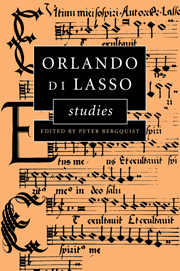Book contents
- Frontmatter
- Contents
- Preface
- List of abbreviations
- 1 Aspects of form in Orlando di Lasso's Magnificat settings
- 2 Orlando di Lasso and Andrea Gabrieli: two motets and their masses in a Munich choir book from 1564–65
- 3 Post-Tridentine liturgical change and functional music: Lasso's cycle of polyphonic Latin hymns
- 4 The salon as marketplace in the 1550s: patrons and collectors of Lasso's secular music
- 5 Lasso's “Standomi un giorno” and the canzone in the mid-sixteenth century
- 6 Lasso's “Fertur in conviviis”: on the history of its text and transmission
- 7 Orlando di Lasso and Rome: personal contacts and musical influences
- 8 Orlando di Lasso as a model for composition as seen in the three-voice motets of Jean de Castro
- 9 The madrigal book of Jean Turnhout (1589) and its relationship to Lasso
- 10 Modal ordering within Orlando di Lasso's publications
- 11 Correct and incorrect accentuation in Lasso's music: on the implied dependence on the text in classical vocal polyphony
- General index
- Index of Lasso compositions and printed sources
2 - Orlando di Lasso and Andrea Gabrieli: two motets and their masses in a Munich choir book from 1564–65
Published online by Cambridge University Press: 18 December 2009
- Frontmatter
- Contents
- Preface
- List of abbreviations
- 1 Aspects of form in Orlando di Lasso's Magnificat settings
- 2 Orlando di Lasso and Andrea Gabrieli: two motets and their masses in a Munich choir book from 1564–65
- 3 Post-Tridentine liturgical change and functional music: Lasso's cycle of polyphonic Latin hymns
- 4 The salon as marketplace in the 1550s: patrons and collectors of Lasso's secular music
- 5 Lasso's “Standomi un giorno” and the canzone in the mid-sixteenth century
- 6 Lasso's “Fertur in conviviis”: on the history of its text and transmission
- 7 Orlando di Lasso and Rome: personal contacts and musical influences
- 8 Orlando di Lasso as a model for composition as seen in the three-voice motets of Jean de Castro
- 9 The madrigal book of Jean Turnhout (1589) and its relationship to Lasso
- 10 Modal ordering within Orlando di Lasso's publications
- 11 Correct and incorrect accentuation in Lasso's music: on the implied dependence on the text in classical vocal polyphony
- General index
- Index of Lasso compositions and printed sources
Summary
In the year 1563 Orlando di Lasso succeeded Ludwig Daser as Kapellmeister at the court of Albrecht V in Munich. From the evidence presented in a small group of choir books written around this time and now held in the Bayerische Staatsbibliothek, Munich, the composition of parody masses by members of the chapel itself had taken on increased importance for the group of composers who worked with the new director. Whereas most manuscripts from the early 1560s still contained masses written either by Daser himself (e.g. Mus. Ms. 18) or by other well-known contemporaries, such as Clemens non Papa or Cipriano de Rore or even Palestrina (e.g. Mus. Mss. 40, 45 and 46), four choir books, all written around 1565, are devoted principally to parody masses by Lasso and the new circle of composers around him (Mus. Mss. 17, 51, 54, and 2746). These include minor figures, such as Johannes Lockenburg, Gottfried Palmarts and Johannes Flori, as well as the better-known Ivo de Vento and Anton Gosswin, but two names stand out in particular, namely Lasso himself and Andrea Gabrieli, the latter represented by no fewer than four masses.
Within this group of choir books, Mus. Ms. 17 stands out both by virtue of its external features and the uniformity of its contents. It seems to have held a special place of honor.
- Type
- Chapter
- Information
- Orlando di Lasso Studies , pp. 20 - 40Publisher: Cambridge University PressPrint publication year: 1999



